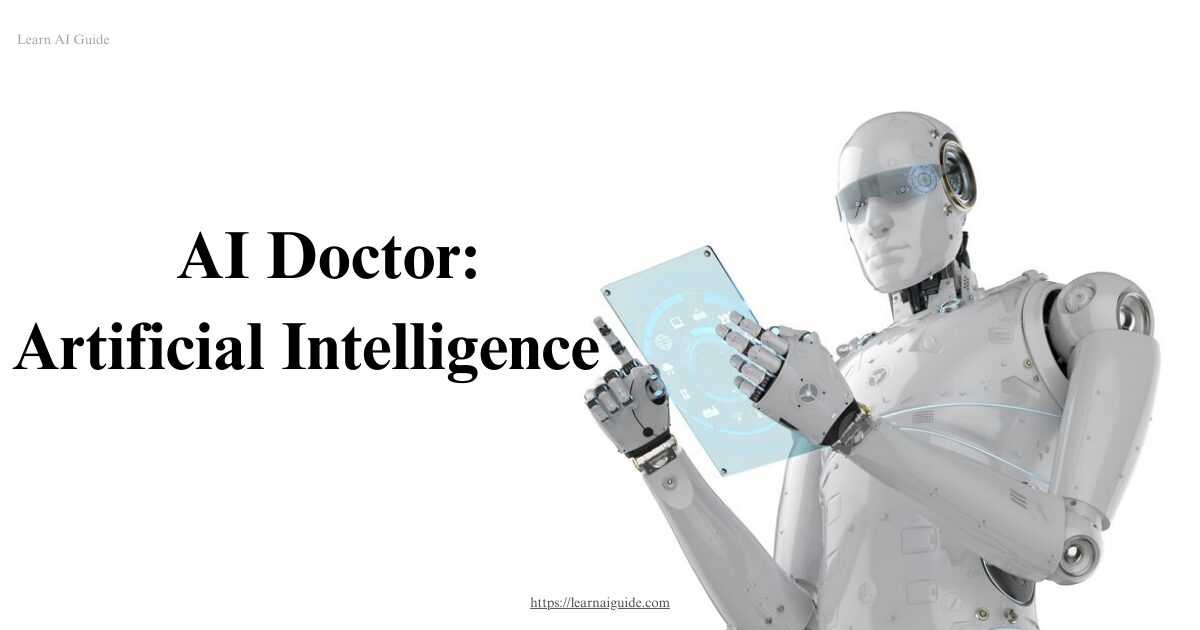Artificial Intelligence (AI) has revolutionized countless industries, and healthcare is no exception. Imagine having access to a doctor anytime, anywhere, without the constraints of traditional healthcare systems.
This is where Artificial Intelligence Doctor steps in. In this comprehensive guide, we explore what Artificial Intelligence Doctor is, its capabilities, benefits, challenges, and what the future holds for this innovative technology.
Introduction
AI Doctor represents a groundbreaking advancement in healthcare, leveraging AI algorithms to provide medical advice, diagnostics, and treatment recommendations.
This technology bridges the gap between patients and healthcare providers, offering round-the-clock accessibility and personalized care. Let’s delve deeper into what makes AI Doctor a game-changer in modern medicine.
Understanding the AI Doctor
What is AI Doctor?
AI Doctor, also known as an AI-powered virtual doctor or AI chatbot, utilizes machine learning algorithms and natural language processing (NLP) to interact with patients. It can analyze symptoms, medical histories, and other healthcare data to offer preliminary diagnoses and healthcare advice. This virtual assistant operates through AI-driven platforms or mobile apps, making healthcare more accessible and convenient for users.
Capabilities of AI Doctor
AI Doctor excels in several key areas:
- 24/7 Accessibility: Unlike traditional healthcare services, AI Doctor is available round-the-clock, allowing users to seek medical advice instantly, anytime they need it.
- Efficiency: It enhances the speed of healthcare delivery by quickly analyzing symptoms and providing accurate diagnoses based on vast datasets and medical knowledge.
- Personalization: Through continuous learning from patient interactions, AI Doctor offers personalized healthcare recommendations tailored to individual needs and medical histories.
What AI Cannot Do in Healthcare
While AI Doctor is revolutionary, it has its limitations:
- Complex Diagnoses: AI may struggle with complex or rare medical conditions that require nuanced understanding and human expertise.
- Emotional Intelligence: Artificial Intelligence Doctor may not fully grasp emotional nuances or provide the empathy that human doctors can offer during patient interactions.
What AI Can and Cannot Do in Healthcare
The Role of AI in Healthcare
Artificial Intelligence in healthcare encompasses various applications beyond Artificial Intelligence Doctor:
- Medical Imaging: AI assists in interpreting medical images like X-rays and MRIs, improving diagnostic accuracy and efficiency.
- Drug Discovery: AI accelerates the drug discovery process by analyzing vast datasets to identify potential treatments and therapies.
- Administrative Tasks: AI streamlines administrative tasks such as scheduling appointments, billing, and maintaining electronic health records (EHRs).
Ethical Considerations
- Data Privacy: Maintaining patient confidentiality and securing sensitive health information is crucial in AI-driven healthcare systems.
- Equity: Ensuring equitable access to Artificial Intelligence Doctor and other Artificial Intelligence healthcare solutions across diverse populations and socioeconomic backgrounds.
The Future of AI Doctor
Advancements in AI Doctor
Future developments in AI Doctor are poised to enhance its capabilities further:
- Predictive Analytics: Artificial Intelligence Doctor may evolve to predict health outcomes and recommend preventive measures based on ongoing health monitoring and data analysis.
- Integration with Wearable Technology: Seamless integration with wearable devices could enable real-time health monitoring and feedback, enhancing proactive healthcare management.
Challenges Ahead
- Regulatory Frameworks: Establishing robust regulatory frameworks to govern AI in healthcare, ensuring safety, efficacy, and ethical use.
- Public Perception: Overcoming skepticism and fostering trust in Artificial Intelligence Doctor among patients and healthcare professionals.
Conclusion
Artificial Intelligence Doctor represents a paradigm shift in healthcare, offering unprecedented accessibility, efficiency, and personalized care. While it cannot replace human doctors entirely, its integration into healthcare systems promises to improve patient outcomes and healthcare delivery globally.
As Artificial Intelligence continues to advance, so too will Artificial Intelligence Doctor, paving the way for a future where healthcare is smarter, more accessible, and more patient-centric than ever before.
In conclusion, Artificial Intelligence Doctor stands at the forefront of healthcare innovation, poised to redefine the patient-doctor relationship and improve healthcare accessibility worldwide.
Embracing this technology responsibly and collaboratively will shape a future where quality healthcare is accessible to all, powered by the transformative capabilities of artificial intelligence.
